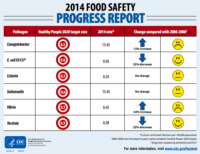The U.S. Department of Agriculture’s (USDA’s) Food Safety and Inspection Service (FSIS) has released a detailed report outlining 16 years worth of Salmonella data.
Serotypes Profile of Salmonella Isolates from Meat and Poultry Products is a 123-page report that dissects data from reported and collected from January 1998 through December 2014. A few highlights from the report include the following:
- Salmonella sickens roughly 1.2 million Americans annually. An estimated 19,000 of those victims are hospitalized and 380 ultimately succumb to their illness.
- Salmonella is the primary cause of bacterial foodborne illness
- Salmonella Kentucky is the most common serotype
FSIS conducts nontyphoidal Salmonella serotype testing on isolates recovered from raw meat and poultry products subject to sampling under the Pathogen Reduction Hazard Analysis and Critical Control Point (PR/HACCP) verification testing program. The results presented here provide an estimate of relative serotype distributions for each product class during the 16-year period following implementation of the PR/HACCP program (1998-2014).
FSIS is committed to implementing, revising and enforcing programs that align with FSIS’ strategic goals and Healthy People 2020 Goals to reduce Salmonella illnesses attributable to FSIS-regulated products. To this end, FSIS reviews serotype data generated through PR/HACCP sampling to monitor trends of isolates identified in various products to proactively guide decisions affecting food safety and public health.
The full report is available on FSIS.USDA.gov.




